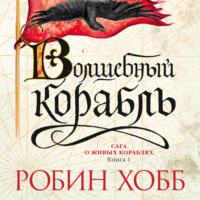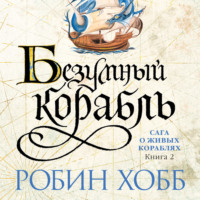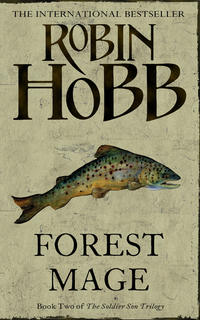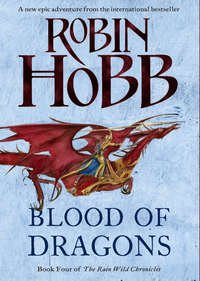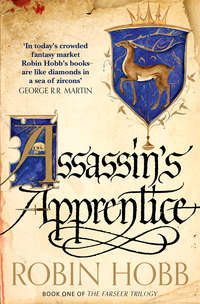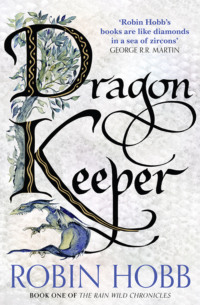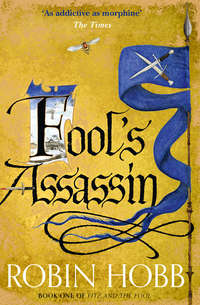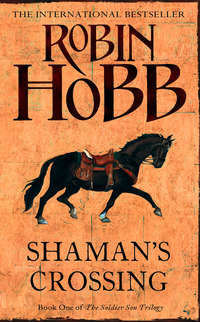
Полная версия
Assassin’s Apprentice
‘Boy don’t have a name,’ Jason volunteered into the silence. ‘Just goes by “boy”.’
This statement seemed to put everyone, even Burrich, at a loss for words. The silence lingered as I finished bread and cheese and meat, and washed it down with a swallow or two of beer that Burrich offered me. The other men left the room gradually, in twos and threes, and still he sat there, drinking and looking at me. ‘Well,’ he said at long last. ‘If I know your father, he’ll face up to it square and do what’s right. But Eda only knows what he’ll think is the right thing to do. Probably whatever hurts the most.’ He watched me silently a moment longer. ‘Had enough to eat?’ he asked at last.
I nodded, and he stood stiffly, to swing me off the table and onto the floor. ‘Come on, then, fitz,’ he said, and moved out of the kitchen and down a different corridor. His stiff leg made his gait ungainly, and perhaps the beer had something to do with it as well. Certainly I had no trouble in keeping up. We came at last to a heavy door, and a guard who nodded us through with a devouring stare at me.
Outside, a chill wind was blowing. All the ice and snow that had softened during the day had gone back to sharpness with the coming of night. The path cracked under my feet, and the wind seemed to find every crack and gap in my garments. My feet and leggings had been warmed by the kitchen’s fire, but not quite dried, so the cold seized on them. I remember darkness, and the sudden tiredness that came over me, a terrible weepy sleepiness that dragged at me as I followed the strange man with the bandaged leg through the chill, dark courtyard. There were tall walls around us, and guards moved intermittently on top of them, dark shadows visible only as they blotted the stars occasionally from the sky. The cold bit at me, and I stumbled and slipped on the icy pathway. But something about Burrich did not permit me to whimper or beg quarter from him. Instead I followed him doggedly. We reached a building and he dragged open a heavy door.
Warmth and animal smells and a dim yellow light spilled out. A sleepy stable-boy sat up in his nest of straw, blinking like a rumpled fledgling. At a word from Burrich he lay down again, curling up small in the straw and closing his eyes. We moved past him, Burrich dragging the door to behind us. He took the lantern that burned dimly by the door and led me on.
I entered a different world then, a night world where animals shifted and breathed in stalls, where hounds lifted their heads from their crossed forepaws to regard me with lambent eyes green or yellow in the lantern’s glow. Horses stirred as we passed their stalls. ‘Hawks are down at the far end,’ Burrich said as we passed stall after stall. I accepted it as something he thought I should know.
‘Here,’ he said finally. ‘This’ll do. For now, anyway. I’m jigged if I know what else to do with you. If it weren’t for the Lady Patience, I’d be thinking this a fine god’s jest on the master. Here, Nosy, you just move over and make this boy a place in the straw. That’s right, you cuddle up to Vixen, there. She’ll take you in, and give a good slash to any that think to bother you.’
I found myself facing an ample box-stall, populated with three hounds. They had roused and lay, stick tails thumping in the straw at Burrich’s voice. I moved uncertainly in amongst them, and finally lay down next to an old bitch with a whitened muzzle and one torn ear. The older male regarded me with a certain suspicion, but the third was a half-grown pup, and Nosy welcomed me with ear lickings, nose nipping and much pawing. I put an arm around him to settle him, and then cuddled in amongst them as Burrich had advised. He threw a thick blanket that smelled much of horse down over me. A very large grey beast in the next stall stirred suddenly, thumping a heavy hoof against the partition, and then hanging his head over to see what the night excitement was about. Burrich calmed him absently with a touch.
‘It’s rough quarters here for all of us at this outpost. You’ll find Buckkeep a more hospitable place. But for tonight, you’ll be warm here, and safe.’ He stood a moment longer, looking down at us. ‘Horse, hound, and hawk, Chivalry. I’ve minded them all for you for many a year, and minded them well. But this by-blow of yours; well, what to do with him is beyond me.’
I knew he wasn’t speaking to me. I watched him over the edge of the blanket as he took the lantern from its hook and wandered off, muttering to himself. I remember that first night well, the warmth of the hounds, the prickling straw, and even the sleep that finally came as the pup cuddled close beside me. I drifted into his mind and shared his dim dreams of an endless chase, pursuing a quarry I never saw, but whose hot scent dragged me onward through nettle, bramble and scree.
And with the hound’s dream, the precision of the memory wavers like the bright colours and sharp edges of a drug dream. Certainly the days that follow that first night have no such clarity in my mind.
I recall the spitting wet days of winter’s end as I learned the route from my stall to the kitchen. I was free to come and go there as I pleased. Sometimes there was a cook in attendance, setting meat onto the hearth-hooks or pummelling bread dough or breaching a cask of drink. More often, there was not, and I helped myself to whatever had been left out on the table, and shared generously with the pup that swiftly became my constant companion. Men came and went, eating and drinking, and regarding me with a speculative curiosity that I came to accept as normal. The men had a sameness about them, with their rough wool cloaks and leggings, their hard bodies and easy movements, and the crest of a leaping buck that each bore over his heart. My presence made some of them uncomfortable. I grew accustomed to the mutter of voices that began whenever I left the kitchen.
Burrich was a constant in those days, giving me the same care he gave to Chivalry’s beasts; I was fed, watered, groomed and exercised, said exercise usually coming in the form of trotting at his heels as he performed his other duties. But those memories are blurry and details, such as those of washing or changing garments, have probably faded with a six-year-old’s calm assumptions of such things as normal. Certainly I remember the hound pup, Nosy. His coat was red and slick and short, and bristly in a way that prickled me through my clothes when we shared the horse blanket at night. His eyes were green as copper ore, his nose the colour of cooked liver, and the insides of his mouth and tongue were mottled pink and black. When we were not eating in the kitchen, we wrestled in the courtyard or in the straw of the box-stall. Such was my world for however long it was I was there. Not too long, I think, for I do not recall the weather changing. All my memories of that time are of raw days and blustery wind, and snow and ice that partially melted each day but were restored by night’s freezes.
One other memory I have of that time, but it is not sharp-edged. Rather it is warm and softly tinted, like a rich old tapestry seen in a dim room. I recall being roused from sleep by the pup’s wriggling and the yellow light of a lantern being held over me. Two men bent over me, but Burrich stood stiffly behind them and I was not afraid.
‘Now you’ve wakened him,’ warned the one, and he was Prince Verity, the man from the warmly-lit chamber of my first evening.
‘So? He’ll go back to sleep as soon as we leave. Damn him, he has his father’s eyes as well. I swear, I’d have known his blood no matter where I saw him. There’ll be no denying it to any that see him. But have neither you nor Burrich the sense of a flea? Bastard or not, you don’t stable a child among beasts. Was there no where else you could put him?’
The man who spoke was like Verity around the jaw and eyes, but there the resemblance ended. This man was younger by far. His cheeks were beardless, and his scented and smoothed hair was finer and brown. His cheeks and forehead had been stung to redness by the night’s chill, but it was a new thing, not Verity’s weathered ruddiness. And Verity dressed as his men dressed, in practical woollens of sturdy weave and subdued colours. Only the crest on his breast showed brighter, in gold and silver thread. But the younger man with him gleamed in scarlets and primrose, and his cloak drooped with twice the width of cloth needed to cover a man. The doublet that showed beneath it was a rich cream, and laden with lace. The scarf at his throat was secured with a leaping stag done in gold, its single eye a winking green gem. And the careful turn of his words were like a twisted chain of gold compared to the simple links of Verity’s speech.
‘Regal, I had given it no thought. What do I know of children? I turned him over to Burrich. He is Chivalry’s man, and as such he’s cared for …’
‘I meant no disrespect to the blood, sir,’ Burrich said in honest confusion. ‘I am Chivalry’s man, and I saw to the boy as I thought best. I could make him up a pallet in the guardroom, but he seems small to be in the company of such men, with their comings and goings at all hours, their fights and drinking and noise.’ The tone of his words made his own distaste for their company obvious. ‘Bedded here, he has quiet, and the pup has taken to him. And with my Vixen to watch over him at night, no one could do him harm without her teeth taking a toll. My lords, I know little of children myself, and it seemed to me …’
‘It’s fine, Burrich, it’s fine,’ Verity said quietly, cutting him off. ‘If it had to be thought about, I should have done the thinking. I left it to you, and I don’t find fault with it. It’s better than a lot of children have in this village, Eda knows. For here, for now, it’s fine.’
‘It will have to be different when he comes back to Buckkeep.’ Regal did not sound pleased.
‘Then our father wishes him to return with us to Buckkeep?’ The question came from Verity.
‘Our father does. My mother does not.’
‘Oh.’ Verity’s tone indicated he had no interest in further discussing that. But Regal frowned and continued.
‘My mother the Queen is not at all pleased about any of this. She has counselled the King long, but in vain. Mother and I were for putting the boy … aside. It is only good sense. We scarcely need more confusion in the line of succession.’
‘I see no confusion in it now, Regal,’ Verity spoke evenly. ‘Chivalry, me, and then you. Then our cousin August. This bastard would be a far fifth.’
‘I am well aware that you precede me; you need not flaunt it at me at every opportunity,’ Regal said coldly. He glared down at me. ‘I still think it would be better not to have him about. What if Chivalry never does get a legal heir on Patience? What if he chooses to recognize this … boy? It could be very divisive to the nobles. Why should we tempt trouble? So say my mother and I. But our father the King is not a hasty man, as well we know. Shrewd is as Shrewd does, as the common folk say. He forbade any settling of the matter. “Regal,” he said, in that way he has. “Don’t do what you can’t undo, until you’ve considered what you can’t do once you’ve done it.” Then he laughed.’ Regal himself gave a short, bitter laugh. ‘I weary so of his humour.’
‘Oh,’ said Verity again, and I lay still and wondered if he were trying to sort out the King’s words, or refraining from replying to his brother’s complaint.
‘You discern his real reason, of course,’ Regal informed him.
‘Which is?’
‘He still favours Chivalry.’ Regal sounded disgusted. ‘Despite everything. Despite his foolish marriage and his eccentric wife. Despite this mess. And now he thinks this will sway the people, make them warmer toward him. Prove he’s a man, that Chivalry can father a child. Or maybe prove he’s a human, and can make mistakes like the rest of them.’ Regal’s tone betrayed that he agreed with none of this.
‘And this will make the people like him more, support his future kingship more? That he fathered a child on some wild woman before he married his queen?’ Verity sounded confused by the logic.
I heard the sourness in Regal’s voice. ‘So the King seems to think. Does he care nothing for the disgrace? But I suspect Chivalry will feel differently about using his bastard in such a way. Especially as it regards dear Patience. But the King has ordered that the bastard be brought to Buckkeep when you return.’ Regal looked down on me as if ill satisfied.
Verity looked briefly troubled, but nodded. A shadow lay over Burrich’s features that the yellow lamplight could not lift.
‘Has my master no say in this?’ Burrich ventured to protest. ‘It seems to me that if he wants to settle a portion on the family of the boy’s mother, and set him aside, then, why surely for the sake of my Lady Patience’s sensibilities, he should be allowed that discretion …’
Prince Regal broke in with a snort of disdain. ‘The time for discretion was before he rolled the wench. The Lady Patience is not the first woman to have to face her husband’s bastard. Everyone here knows of his existence; Verity’s clumsiness saw to that. There’s no point to trying to hide him. And as far as a royal bastard is concerned, none of us can afford to have such sensibilities, Burrich. To leave such a boy in a place like this is like leaving a weapon hovering over the King’s throat. Surely even a houndsman can see that. And even if you can’t, your master will.’
An icy harshness had come into Regal’s voice, and I saw Burrich flinch from his voice as I had seen him cower from nothing else. It made me afraid, and I drew the blanket up over my head and burrowed deeper into the straw. Beside me, Vixen growled lightly in the back of her throat. I think it made Regal step back, but I cannot be sure. The men left soon after, and if they spoke any more than that, no memory of it lies within me.
Time passed, and I think it was two, or perhaps three weeks later that I found myself clinging to Burrich’s belt and trying to wrap my short legs around a horse behind him as we left that chill village and began what seemed to me an endless journey down to warmer lands. I suppose at some point Chivalry must have come to see the bastard he had sired, and must have passed some sort of judgement on himself as regarded me. But I have no memory of such a meeting with my father. The only image I carry of him in my mind is from his portrait on the wall in Buckkeep. Years later I was given to understand that his diplomacy had gone well indeed, securing a treaty and peace that lasted well into my teens and earning the respect and even fondness of the Chyurda.
In truth, I was his only failure that year, but I was a monumental one. He preceded us home to Buckkeep, where he abdicated his claim to the throne. By the time we arrived, he and Lady Patience were gone from court, to live as the Lord and Lady of Withywoods. I have been to Withywoods. Its name bears no relationship to its appearance. It is a warm valley, centred on a gently flowing river that carves a wide plain that nestles between gently rising and rolling foothills. A place to grow grapes and grain and plump children. It is a soft holding, far from the borders, far from the politics of court, far from anything that had been Chivalry’s life up to then. It was a pasturing out, a gentle and genteel exile for a man who would have been king. A velvet smothering for a warrior and a silencing of a rare and skilled diplomat.
And so I came to Buckkeep, sole child and bastard of a man I’d never know. Prince Verity became King-in-Waiting and Prince Regal moved up a notch in the line of succession. If all I had ever done was to be born and discovered, I would have left a mark across all the land for all time. I grew up fatherless and motherless in a court where all recognized me as a catalyst. And a catalyst I became.
TWO

Newboy
There are many legends about Taker, the first Outislander to claim Buckkeep as the First Duchy and the founder of the royal line. One is that the raiding voyage he was on was his first and only foray out from whatever cold harsh island bore him. It is said that upon seeing the timbered fortifications of Buckkeep, he had announced, ‘If there’s a fire and a meal there, I shan’t be leaving again.’ And there was, and he didn’t.
But family rumour says that he was a poor sailor, made sick by the heaving water and salt-fish rations that other Outislanders throve upon. He and his crew had been lost for days upon the water, and if he had not managed to seize Buckkeep and make it his own, his crew would have drowned him. Nevertheless, the old tapestry in the Great Hall shows him as a well-thewed stalwart grinning fiercely over the prow of his vessel as his oarsmen propel him toward an ancient Buckkeep of logs and poorly dressed stone.
Buckkeep had begun its existence as a defensible position on a navigable river at the mouth of a bay with excellent anchorage. Some petty landchief, whose name has been lost in the mists of history, saw the potential for controlling trade on the river and built the first stronghold there. Ostensibly, he had built it to defend both river and bay from the Outislander raiders who came every summer to plunder up and down the river. What he had not reckoned on were the raiders that infiltrated his fortifications by treachery. The towers and walls became their toehold. They moved their occupations and domination up the river, and, rebuilding his timber fort into towers and walls of dressed stone, finally made Buckkeep the heart of the First Duchy, and eventually the capital of the kingdom of the Six Duchies.
The ruling house of the Six Duchies, the Farseers, were descended from those Outislanders. They had, for several generations, kept up their ties with the Outislanders, making courting voyages and returning home with plump dark brides of their own folk. And so the blood of the Outislanders still ran strong in the royal lines and the noble houses, producing children with black hair and dark eyes and muscled, stocky limbs. And with those attributes went a predilection for the Skill, and all the dangers and weaknesses inherent in such blood. I had my share of that heritage, too.
But my first experience of Buckkeep held nothing of history or heritage. I knew it only as an end place for a journey, a panorama of noise and people, carts and dogs and buildings and twisting streets that led finally to an immense stone stronghold on the cliffs that overlooked the city sheltered below it. Burrich’s horse was weary, and his hooves slipped on the often slimy cobbles of the city streets. I held on grimly to his belt, too weary and aching even to complain. I craned my head up once to stare at the tall grey towers and walls of the keep above us. Even in the unfamiliar warmth of the sea breeze, it looked chill and forbidding. I leaned my forehead against his back and felt ill in the brackish iodine smell of the immense water. And that was how I came to Buckkeep.
Burrich had quarters over the stables, not far from the mews. It was there he took me, along with the hounds and Chivalry’s hawk. He saw to the hawk first, for it was sadly bedraggled from the trip. The dogs were overjoyed to be home, and were suffused with a boundless energy that was very annoying to anyone as weary as I. Nosy bowled me over half a dozen times before I could convey to his thick-skulled hound’s mind that I was weary and half-sick and in no mood for play. He responded as any pup would, by seeking out his former litter-mates and immediately getting himself into a semi-serious fight with one of them that was quelled by a shout from Burrich. Chivalry’s man he might be, but when he was at Buckkeep, he was the Master for hounds, hawks, and horses.
His own beasts seen to, he proceeded to walk through the stables, surveying all that had been done, or left undone, in his absence. Stable-boys, grooms, and falconers appeared as if by magic to defend their charges from any criticisms. I trotted at his heels for as long as I could keep up. It was only when I finally surrendered, and sank wearily onto a pile of straw, that he appeared to notice me. A look of irritation, and then great weariness passed across his face.
‘Here, you, Cob. Take young fitz there to the kitchens and see that he’s fed, and then bring him back up to my quarters.’
Cob was a short, dark dog-boy, perhaps ten years old, who had just been praised over the health of a litter that had been whelped in Burrich’s absence. Moments before he had been basking in Burrich’s approval. Now his grin faltered, and he looked at me dubiously. We regarded one another as Burrich moved off down the line of stalls with his entourage of nervous caretakers. Then the boy shrugged, and went into a half-crouch to face me. ‘Are you hungry, then, fitz? Shall we go find you a bite?’ he asked invitingly, in exactly the same tone as he had used to coax his puppies out where Burrich could see them. I nodded, relieved that he expected no more from me than from a puppy, and followed him.
He looked back often to see if I were keeping up. No sooner were we outside the stables than Nosy came frolicking up to join me. The hound’s evident affection for me raised me in Cob’s estimation, and he continued to speak to both of us in short encouraging phrases, telling us there was food just ahead, come along now, no, don’t go off sniffing after that cat, come along now, there’s some good fellows.
The stables had been bustling, with Verity’s men putting up their horses and gear and Burrich finding fault with all that had not been done up to his standards in his absence. But as we drew closer to the inner keep, the foot traffic increased. Folk brushed by us on all manner of errands: a boy carrying an immense slab of bacon on his shoulder, a giggling cluster of girls, arms heavy with stewing reeds and heather, a scowling old man with a basket of flopping fish, and three young women in motley and bells, their voices ringing as merrily as their chimes.
My nose informed me that we were getting closer to the kitchens, but the traffic increased proportionately until we drew near a door with a veritable crush of people going in and out. Cob stopped, and Nosy and I paused behind him, noses working appreciatively. He regarded the press of folk at the door, and frowned to himself. ‘Place is packed. Everyone’s getting ready for the welcoming feast tonight, for Verity and Regal. Anyone who’s anyone has come into Buckkeep for it; word spread fast about Chivalry ducking out on the kingship. All the dukes have come or sent a man to counsel about it. I hear even the Chyurda sent someone, to be sure Chivalry’s treaties will be honoured if Chivalry is no longer about …’
He halted, suddenly embarrassed, but whether it was because he was speaking of my father to the cause of his abdication, or because he was addressing a puppy and a six-year-old as if they had intelligence, I am not sure. He glanced about, reassessing the situation. ‘Wait here,’ he told us finally. ‘I’ll slip in and bring something out for you. Less chance of me getting stepped on … or caught. Now stay.’ And he reinforced his command with a firm gesture of his hand. I backed up to a wall and crouched down there, out of traffic’s way, and Nosy sat obediently beside me. I watched admiringly as Cob approached the door, and slipped between the clustered folk, eeling smoothly into the kitchens.
With Cob out of sight, the more general populace claimed my attention. Largely the folk that passed us were serving people and cooks, with a scattering of minstrels and merchants and delivery folk. I watched them come and go with a weary curiosity. I had already seen too much that day to find them of great interest. Almost more than food I desired a quiet place away from all this activity. I sat flat on the ground, my back against the sun-warmed wall of the keep, and put my forehead on my knees. Nosy leaned against me.
Nosy’s stick tail beating against the earth roused me. I lifted my face from my knees, to perceive a tall pair of brown boots before me. My eyes travelled up rough leather pants and over a coarse wool shirt to a shaggy, bearded face thatched with pepper-grey hair. The man staring down at me balanced a small keg on one shoulder.


